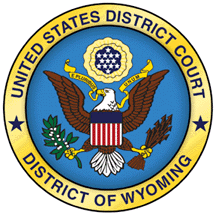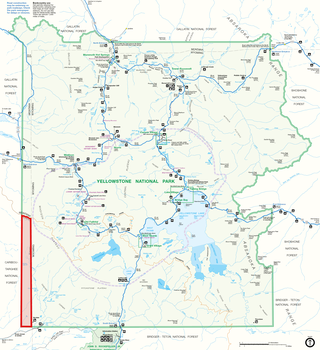Related Research Articles

The Twenty-fifth Amendment to the United States Constitution addresses issues related to presidential succession and disability.
A perfect crime is a crime that is undetected, unattributed to an identifiable perpetrator, or otherwise unsolved or unsolvable. The term is used colloquially in law and fiction for both crimes committed as crimes foremost, and those committed as a kind of technical achievement on the part of the perpetrator.

The United States District Court for the District of Wyoming is the federal district court whose jurisdiction comprises the state of Wyoming and those portions of Yellowstone National Park situated in Montana and Idaho; it is the only federal court district that includes portions of more than one state, creating a possible "Zone of Death" where it would be difficult to prosecute crimes. The court has locations in Cheyenne and Casper.

Jonathan Turley is an American attorney, legal scholar, writer, commentator, and legal analyst in broadcast and print journalism. A professor at George Washington University Law School, he has testified in United States congressional proceedings about constitutional and statutory issues. He has also testified in multiple impeachment hearings and removal trials in Congress, including the impeachment of President Bill Clinton and both the first and second impeachments of President Donald Trump. Turley is a First Amendment advocate and writes frequently on free speech restrictions in the private and public sectors.
Reva B. Siegel is the Nicholas deB. Katzenbach Professor of Law at Yale Law School. Siegel's writing draws on legal history to explore questions of law and inequality, and to analyze how courts interact with representative government and popular movements in interpreting the Constitution. She is currently writing on the role of social movement conflict in guiding constitutional change, addressing this question in recent articles on reproductive rights, originalism and the Second Amendment, the "de facto ERA," and the enforcement of Brown. Her publications include Processes of Constitutional Decisionmaking ; The Constitution in 2020 ; and Directions in Sexual Harassment Law. Professor Siegel received her B.A., M.Phil, and J.D. from Yale University, clerked for Judge Spottswood William Robinson III on the D.C. Circuit, and began teaching at the University of California at Berkeley. She is a member of the American Academy of Arts and Sciences, and is active in the American Society for Legal History, the Association of American Law Schools, the American Constitution Society, in the national organization and as faculty advisor of Yale's chapter. She was elected to the American Philosophical Society in 2018.

Mark Victor Tushnet is an American legal scholar. He specializes in constitutional law and theory, including comparative constitutional law, and is currently the William Nelson Cromwell Professor of Law at Harvard Law School. Tushnet is identified with the critical legal studies movement.
Steven Gow Calabresi is an American legal scholar who is the Clayton J. and Henry R. Barber Professor of Law at Northwestern University. He is the co-chairman of the Federalist Society. He is the nephew of Guido Calabresi, a U.S. Appellate judge and former dean of the Yale Law School.
A citizen's right to a trial by jury is a central feature of the United States Constitution. It is considered a fundamental principle of the American legal system.

The United States Constitution contains several provisions regarding the law of criminal procedure.
The Vicinage Clause is a provision in the Sixth Amendment to the United States Constitution regulating the vicinity from which a jury pool may be selected. The clause says that the accused shall be entitled to an "impartial jury of the State and district wherein the crime shall have been committed, which district shall have been previously ascertained by law". The Vicinage Clause limits the vicinity of criminal jury selection to both the state and the federal judicial district where the crime has been committed. This is distinct from the venue provision of Article Three of the United States Constitution, which regulates the location of the actual trial.
Michael J. Gerhardt is the Samuel Ashe Distinguished Professor of Constitutional Law at the University of North Carolina School of Law in Chapel Hill. He is also the director of the Center on Law and Government at the University of North Carolina at Chapel Hill and is an expert on constitutional law, separation of powers, and the legislative process. He is a Scholar in Residence at the National Constitution Center and visiting scholar at the University of Pennsylvania Law School. On December 2, 2019, it was announced that Gerhardt would testify before the House Judiciary Committee regarding the constitutional grounds for presidential impeachment in the impeachment inquiry against Donald Trump.

Population Zero is a 2016 found footage crime thriller film directed by Adam Levins that premiered at the Newport Beach International Film Festival on April 26, 2016.
Catherine J. Ross is the Lyle T. Alverson Professor of Law at The George Washington University Law School where she is a constitutional law expert specializing in the First Amendment and civil liberties more generally as well as family law and issues affecting children and families including education and child custody.
The president of the United States is authorized by the U.S. Constitution to grant a pardon for a federal crime. The other forms of the clemency power of the president are commutation of sentence, remission of fine or restitution, and reprieve. A person may decide not to accept a pardon, in which case it does not take effect, according to a Supreme Court majority opinion in Burdick v. United States. In 2021, the 10th Circuit ruled that acceptance of a pardon does not constitute a legal confession of guilt, recognizing the Supreme Court's earlier language as authoritative.

The Zone of Death is the 50-square-mile (130 km2) area in the Idaho section of Yellowstone National Park in which, as a result of a reported loophole in the Constitution of the United States, a person may be able to theoretically avoid conviction for any major crime, up to and including murder.

On January 2, 2021, during an hour-long conference call, then-U.S. President Donald Trump pressured Georgia Secretary of State Brad Raffensperger to change the state's election results from the 2020 presidential election. Trump had been defeated by Joe Biden in the election, but refused to accept the outcome, and made a months-long effort to overturn the results. Prior to the call to Raffensperger, Trump and his campaign spoke repeatedly to state and local officials in at least three states in which he had lost, urging them to recount votes, throw out some ballots, or replace the Democratic slate of electors with a Republican slate. Trump's call with Raffensperger was reported by The Washington Post and other media outlets the day after it took place.

The second impeachment trial of Donald Trump, the 45th president of the United States, began on February 9, 2021, and concluded with his acquittal on February 13. Donald Trump had been impeached for the second time by the House of Representatives on January 13, 2021. The House adopted one article of impeachment against Trump: incitement of insurrection. He is the only U.S. president and only federal official to be impeached twice. He was impeached by the House seven days prior to the expiration of his term and the inauguration of Joe Biden. Because he left office before the trial, this was the first impeachment trial of a former president. The article of impeachment addressed Trump's attempts to overturn the 2020 presidential election results and stated that Trump incited the attack on the Capitol in Washington, D.C., while Congress was convened to count the electoral votes and certify the victory of Joe Biden and Kamala Harris.
Richard Davies Parker is an American legal scholar who serves as the Paul W. Williams Professor of Criminal Justice at Harvard Law School, where he has taught constitutional law and criminal law since 1974. He also serves as chairman of the Citizens Flag Alliance, an American nonprofit organization dedicated to advancing a constitutional amendment that would protect the American flag against acts of physical desecration.

In the United States, federal impeachment is the process by which the House of Representatives charges the president, vice president, or another civil federal officer for alleged misconduct. The House can impeach an individual with a simple majority of the present members or other criteria adopted by the House according to Article One, Section 2, Clause 5 of the U.S. Constitution.
A sitting president of the United States has both civil and criminal immunity for their official acts. Neither civil nor criminal immunity is explicitly granted in the Constitution or any federal statute.
References
- 1 2 3 "Brian C. Kalt: Faculty Profile: Michigan State University College of Law".
- 1 2 "Prof. Brian C. Kalt".
- ↑ Kalt, Brian C. (January 26, 2009). "Can the President Undo a Pardon?". Washington Post – via washingtonpost.com.
- ↑ Kalt, Brian C. (January 25, 2017). "The Emoluments Clause for Dummies". Wall Street Journal – via wsj.com.(Subscription required.)
- ↑ "Is Yellowstone Ripe for a Crime Spree?". NPR.org. National Public Radio . Retrieved September 18, 2021.
- ↑ "Prof. Brian Kalt Presents: The Perfect Crime". cuinvolved.creighton.edu. Retrieved September 18, 2021.
- 1 2 Matthews, Dylan (May 22, 2014). "You can get away with murder in part of Idaho". Vox . Retrieved September 18, 2021.
- 1 2 3 Czopek, Madison (June 4, 2021). "No, murder is not legal in a 'zone of death' in Yellowstone National Park". PolitiFact . Retrieved April 26, 2022.
- ↑ "Debunking the relevancy of Yellowstone's 'Zone of Death' to the Gabby Petito case". The Independent . September 17, 2021. Retrieved September 18, 2021.
- ↑ "Legal scholar chides Trump impeachment defense for misrepresenting his writings". NBC News. February 9, 2021. Retrieved September 18, 2021.
- ↑ Lambe, Jerry (February 8, 2021). "Law Professor Cited 15 Times by Trump's Legal Team Says Impeachment Memo Was Filled with 'Flat-Out Misrepresentations' of His Work". Law and Crime .
- ↑ "'I Said The Opposite': Criticism Of Trump's Impeachment Defense Intensifies". National Public Radio.
- ↑ Wolfe, Jan (February 8, 2021). "Impeachment expert says Trump's lawyers distorted his work 'quite badly'". Reuters . Retrieved September 18, 2021.
- ↑ ""Read the Brief..."". The New York Times . February 2, 2021. Retrieved February 9, 2021.
- ↑ Kalt, Brian C. (2019). Unable: The Law, Politics, and Limits of Section 4 of the Twenty-Fifth Amendment. New York: Oxford University Press. ISBN 9780190083199. OCLC 1099543411.
- ↑ Kalt, Brian C. (2012). Constitutional cliffhangers : a legal guide for presidents and their enemies. New Haven [Conn.]: Yale University Press. ISBN 9780300123517. OCLC 842262440.
- ↑ Kalt, Brian C. (2001). Sixties sandstorm: the fight over the establishment of Sleeping Bear Dunes National Lakeshore, 1961-1970. East Lansing: Michigan State University Press. ISBN 9780870135590. OCLC 43648477.
- ↑ Kalt, Brian C. (2005). "The Perfect Crime". Georgetown Law Journal . 93 (2). Rochester, NY. SSRN 691642.